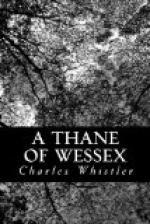Then the old man blessed me, telling me again that I should surely prosper unless that I failed by my own fault, and that it seemed to him that there was yet work for me to do that should set me again in my place, and maybe higher.
So talking with him, Wulfhere called me, and I must needs say farewell to Turkil and his father, and they bade us return, when the time came, by this way back to our own place. And Turkil wept, and would fain have gone with us, but I promised to see him again, and waved hand to him before the broad meadows of the mark were passed, and the woods hid the village from us.
Then did Alswythe, in her kindness, fall into a like mistake as that I had made with the boy; for she turned to me, smiling, and said that she would surely take him into her service at Stert, and see to his training hereafter, but then remembered that she had no longer home, and her smile faded into tears.
My heart ached for her, knowing I could give her no comfort. After that we rode in silence, and quickly, for the track was good.
Now there is little to tell of that ride till we reached the hilltop that Wulfhere knew, and where we could look down on the land we were to cross, and fancy we could see Glastonbury far away. Here Dudda the Collier’s task was ended, and I called him to me, pulling out the purse the good prioress had given me, that I might give him a gold piece for his faithful service.
He stood before me, cap in hand, and I gave him a bright new coin, and he took it, turning it over curiously.
“Take it, Dudda,” I said, “you have earned it well.”
Then he grinned in his way, and answered: “It is no good to me, master. I pray you give me silver instead. Like were I to starve if life lay in the changing of this among our poor folk.”
So I turned over the money to find silver, but there was not enough, and so I took out that bag which I had found in the roadway, and had not opened since, having almost forgotten it. There was silver and copper only in that, and I began to give him his reward.
But still the man hesitated, and seemed anxious to ask me something, and, while I counted out the money, he spoke: “Master, the men call you Heregar, and that is an outlaw’s name.”
“Well.” said I, fearing no reproach from that just now, and being sure that by this time the man knew all about me from our thralls with us. “Heregar, the outlawed thane I was, and am, except that the sheriff has bid me ride on his business.”
“Then, master,” said he, “give me no reward but to serve you. No man’s man am I, either free or unfree, but son of escaped thralls who are dead long ago. Therefore am I outlaw also by all rights, and would fain follow you. And it seems to me that you will need one to mind your steed.”
Now this was a long speech for the collier, who, as I had learnt, could hold his tongue: and we were short-handed also, with all these horses. Therefore I told him that it should be as he would, for service offered freely in this way was like to be faithful, seeing that there had been trial on both sides. But I gave him four silver pennies, which he would have refused, but that I bade him think of them as fasten pennies, which contented him well.




